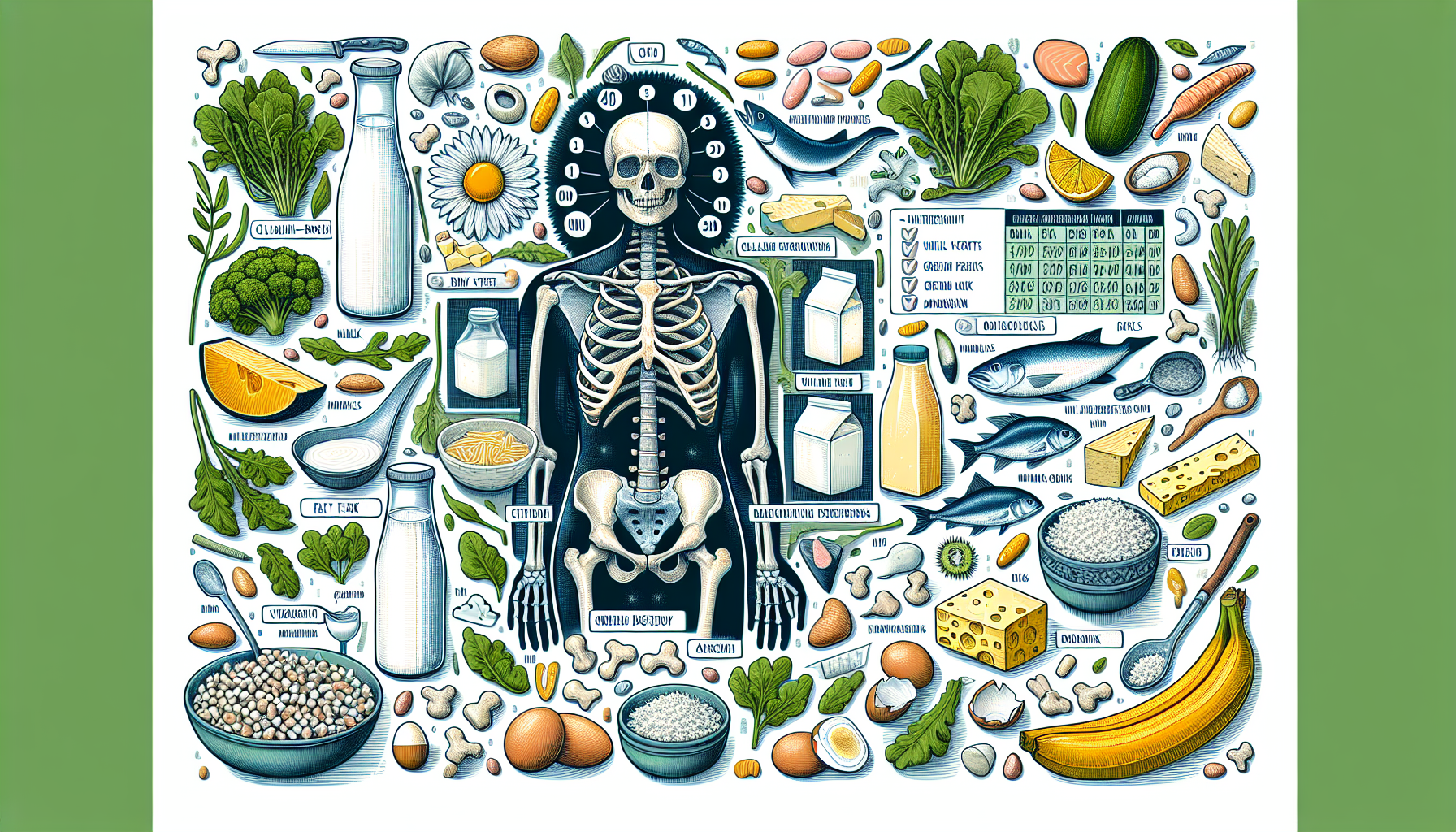When it comes to bone health, calcium and vitamin D usually get all the glory. However, they’re part of a broader nutritional team that’s essential for maintaining healthy bones. This article explores the less-heralded but equally important nutrients that play a crucial role in bone health and how you can ensure you’re getting enough of them in your diet.
Understanding Bone Composition and Nutrient Requirements
Bones are living tissues that continuously break down and rebuild. While calcium is a major component of bone tissue, providing the framework, other nutrients are vital for the formation, density, and strength of bones.
Magnesium is one such nutrient. It helps convert vitamin D into its active form, which in turn regulates calcium absorption and bone formation. A lack of magnesium can lead to weakened bones and increased risk of fractures.
Phosphorus works closely with calcium to build strong bones and teeth. It’s important to maintain a proper balance of calcium and phosphorus in the body for bone health.
Vitamin K is necessary for the synthesis of osteocalcin, a protein that binds calcium to bones, improving bone strength. Without sufficient vitamin K, bone mineralization is impaired.
Zinc plays a role in bone growth and in the mineralization process. It also supports the activities of osteoblasts (cells that form bone) and osteoclasts (cells that break down bone).
Copper is involved in the formation of collagen, a key component of the bone matrix.
Manganese is essential for bone mineralization and the synthesis of cartilage and connective tissues in the skeletal system.
Diet and Supplementation for Bone Nutrient Intake
To ensure adequate intake of these critical nutrients, a balanced diet rich in fruits, vegetables, nuts, seeds, dairy, and lean proteins is important. For those who may not get enough from their diet, supplements might be considered. However, it’s essential to consult with a healthcare provider before starting any supplementation.
For more information on how these nutrients contribute to bone health, please visit Bone Health.
The Role of Lifestyle in Nutrient Absorption and Bone Health
Lifestyle choices, including diet, exercise, and exposure to sunlight (for vitamin D synthesis), significantly impact nutrient absorption and bone health. For example, excessive alcohol consumption can interfere with the body’s ability to absorb magnesium, while smoking can decrease bone density.
For a deeper understanding of how lifestyle choices affect bone mass and health, read more on The Influence of Lifestyle Choices on Bone Mass and Health.
Understanding the Full Nutrient Spectrum for Bone Health
Let’s delve deeper into understanding how each of these nutrients supports bone health:
Magnesium
Magnesium is crucial for bone integrity and strength. It stimulates the hormone calcitonin, which helps preserve bone structure by drawing calcium out of the blood and soft tissues back into the bones. Good sources of magnesium include leafy greens, nuts, seeds, and whole grains.
Phosphorus
Phosphorus is found in every cell of the body, with 85% present in the bones and teeth. It’s found in protein-rich foods like meat, poultry, fish, eggs, dairy products, and legumes.
Vitamin K
Vitamin K is found in two forms: K1 (phylloquinone), which is present in green leafy vegetables, and K2 (menaquinone), found in fermented foods and animal products. K2 is particularly important for bone health, as it is more bioavailable and has a longer half-life in the bloodstream than K1.
Zinc
Zinc deficiency can lead to growth retardation and delayed skeletal maturation. To ensure sufficient zinc intake, include foods like oysters, beef, pumpkin seeds, and chickpeas in your diet.
Copper
Copper helps form hemoglobin and collagen, and it works in balance with zinc and manganese. It can be found in organ meats, shellfish, nuts, seeds, and whole-grain products.
Manganese
Manganese is critical for bone development and maintenance. It can be sourced from whole grains, nuts, legumes, and green vegetables.
Additional Factors That Support Bone Health
In addition to these nutrients, lifestyle factors such as regular exercise, particularly weight-bearing and strength-training activities, are vital for bone health. Additionally, avoiding a sedentary lifestyle can prevent bone density loss.
For insights into the effects of inactivity on bones, check out The Effects of Prolonged Sedentary Lifestyle on Bone Density.
External Resources for Further Reading
A deeper dive into the significance of these nutrients can be found in niche studies and publications. Here are a few select resources that provide further insights:
- A study on the impact of magnesium on bone health, highlighting its importance in bone density and prevention of osteoporosis.
- Detailed information on vitamin K and its role in bone metabolism can be found in scientific journals.
- For those interested in understanding the complex relationship between trace elements and bone health, a comprehensive review is available here.
- An article detailing the role of zinc in bone formation and bone diseases is an excellent resource for understanding zinc’s multifaceted impact on bone health.
- Information on the importance of copper and manganese in maintaining bone health can be found in specialized articles like this one.
Conclusion
While calcium and vitamin D are essential for bone health, it’s important not to overlook the myriad other nutrients that contribute to strong and healthy bones. A balanced diet, along with lifestyle modifications and regular exercise, can help ensure that your body gets all the nutrients it needs for optimal bone health.
Remember, consultations with healthcare providers are crucial when considering dietary changes or supplementation for bone health, as they can provide personalized advice based on individual health needs and conditions.



